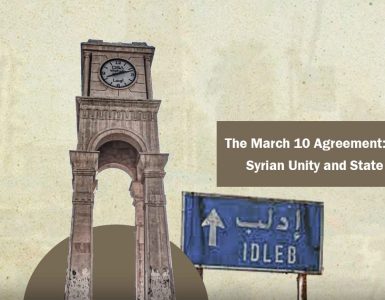Yesterday, on Sunday, in Al-Sheikh Maqsoud neighborhood of Aleppo, a group of Syrian women met and held a symposium to discuss prospects of a political resolution and ways to restore the occupied Syrian territories (Afrin as an example) and the pivotal role of women in achieving that.
Representatives of political parties, Syrian women of various orientations, and women from the occupied Afrin region participated in the symposium called for by the Women’s Bureau of the Syrian Democratic Council. The symposium was under the title “The Strategy for the Liberation of Afrin by Woman’s Prospects”.
The first session of the symposium dealt with the issue of the occupation of Afrin and the role of international balances and the aspirations of regional powers, where the administrator of the Aleppo Center of the Syrian Democratic Council, Jihan Muhammad, spoke about Turkey’s exploitation of the contradictions of international powers and use them as political papers and humanitarian issues to achieve expansionist goals and occupy neighboring territories, disregarding international and humanitarian laws.
Regarding the Syrian resolution and the developments of the political scene, Sarah Khalil, an activist in the field of women’s rights in Aleppo, said that the Syrian situation needs an intra-Syrian national dialogue, which would be a sign of agreement among national powers and the continuation of the political process in accordance with international decisions.
On the possibility of normalization between “Ankara and Damascus,” Khalil said that “This rapprochement will not serve the interest of Syrian people in light of occupation of large parts of north of Syria by Turkey, but on the contrary, it will make the Syrian crisis more complex and will not end the Syrian massacre”.
Also, she stressed the need to end the occupation and eliminate terrorism, in preparation for building a modern Syria according to civilized foundations that respect pluralism and diversity and encourage participation and the privacy of the Syrian regions.
Jihan Muhammad also shed light on the importance of the Afrin site, located in the far northwest of Syria, and the nature and wealth of the region, and most important thing is its demographics, in which since occupation of Afrin in 2018, Turkey has worked to change its demographics and establish settlements for a long-term goal that serves Turkey’s expansionist policies.
At the end of the first session, Muhammad called on the international community and the League of Arab States to confront Turkey’s expansionist policies and warned of the danger of Turkey’s practices and policies for regional security and stability. She called on all Syrian women, Syrian people, and national democratic powers to unite and pursue a dialogue in order to end the Turkish occupation of Afrin and the rest of the Syrian regions.
While the second session of the symposium discussed the role of women and their resistance in Afrin and strategies for return, where the member of the Relations Bureau of the Syrian Democratic Council, Zaynab Qanbar, spoke about the resistance of women in Afrin during the Turkish bombing and the flagrant violations they were subjected to amount to crimes against humanity, pointing out the repercussions of the Turkish occupation of the Afrin region and Syria in general, and the severe reality that was experienced by women in the displacement camps.
In order to end this occupation, Qanbar called on the Syrian women to increase the pace of their work, get benefit from energies and expand their relations, so that the issue of liberating Afrin and all occupied Syrian regions should be a priority for women’s struggle and pressure on Turkey in international forums and humanitarian platforms and work at all levels until all Syrian territories are restored.
The Syrian Democratic Council has worked through the Women’s Bureau since its establishment to unify the efforts of Syrian women after empowering them. It also attaches a great importance to the need for the actual involvement of women in the political process and the consolidation of participation in national decision-making and determining the fate of the country.












